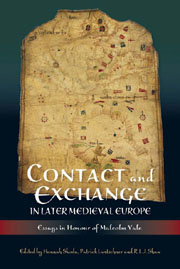Book contents
- Frontmatter
- Contents
- List of Illustrations
- List of Contributors
- Acknowledgements
- The Work of Malcolm Vale
- Principal Bibliography of Malcolm Vale
- Introduction
- Part I Boundaries and Units
- Part II Practices of Exchange
- Introduction
- In and Out of Africa: Iberian Courts and the Afro-Portuguese Olifant of the Late 1400s
- The Knowledge and Use of the ‘Teachings of Saint Louis’ in Fourteenth-Century England
- Philip of Chieti in Flanders, 1303–1305
- The Last Week of the Life of Edward the Black Prince
- Tournament Culture in the Low Countries and England
- Conclusions
- Index
- Tabula Gratulatoria
Introduction
from Part II - Practices of Exchange
Published online by Cambridge University Press: 05 February 2013
- Frontmatter
- Contents
- List of Illustrations
- List of Contributors
- Acknowledgements
- The Work of Malcolm Vale
- Principal Bibliography of Malcolm Vale
- Introduction
- Part I Boundaries and Units
- Part II Practices of Exchange
- Introduction
- In and Out of Africa: Iberian Courts and the Afro-Portuguese Olifant of the Late 1400s
- The Knowledge and Use of the ‘Teachings of Saint Louis’ in Fourteenth-Century England
- Philip of Chieti in Flanders, 1303–1305
- The Last Week of the Life of Edward the Black Prince
- Tournament Culture in the Low Countries and England
- Conclusions
- Index
- Tabula Gratulatoria
Summary
Contact and exchange is not a process that just happens: even when unconsciously undertaken, it has agents, and depends upon particular networks and structures, as well as the mechanisms themselves, technological or otherwise, of communication. Recent methodological developments in transnational studies and histoire croisée oblige us, in focusing upon the processes of exchange, to look to the actors and mechanisms which made this possible. In this section of the volume we explore the different modes through which exchanges could be conducted and the transformative nature of exchange relationships.
Although social, political and cultural boundaries became more stridently articulated in this period, they were, in many ways, challenged and subverted by exchanges, notably by travel and trading interests. Yet these papers also point to an alternative paradigm: firmer boundaries could actually lead to intensified processes of exchange, rendering it an increasingly self-conscious process. Contacts took on new and highly charged meanings, as Costa-Gomes demonstrates in her essay on the gifting of objects from West Africa. She illustrates that as objects were transferred across increasingly strongly circumscribed and physically challenging political and geographical boundaries (the sea), the distant origins of the objects became all the more important in giving them meaning. Likewise, institutions of exchange assumed an ever greater prominence, with the result that contacts invited reflection and comment. Lachaud'ss paper points to the importance of some of these institutions, including the 'sinternational's orders of the friars, in spreading ideas.
- Type
- Chapter
- Information
- Contact and Exchange in Later Medieval EuropeEssays in Honour of Malcolm Vale, pp. 161 - 166Publisher: Boydell & BrewerPrint publication year: 2012

